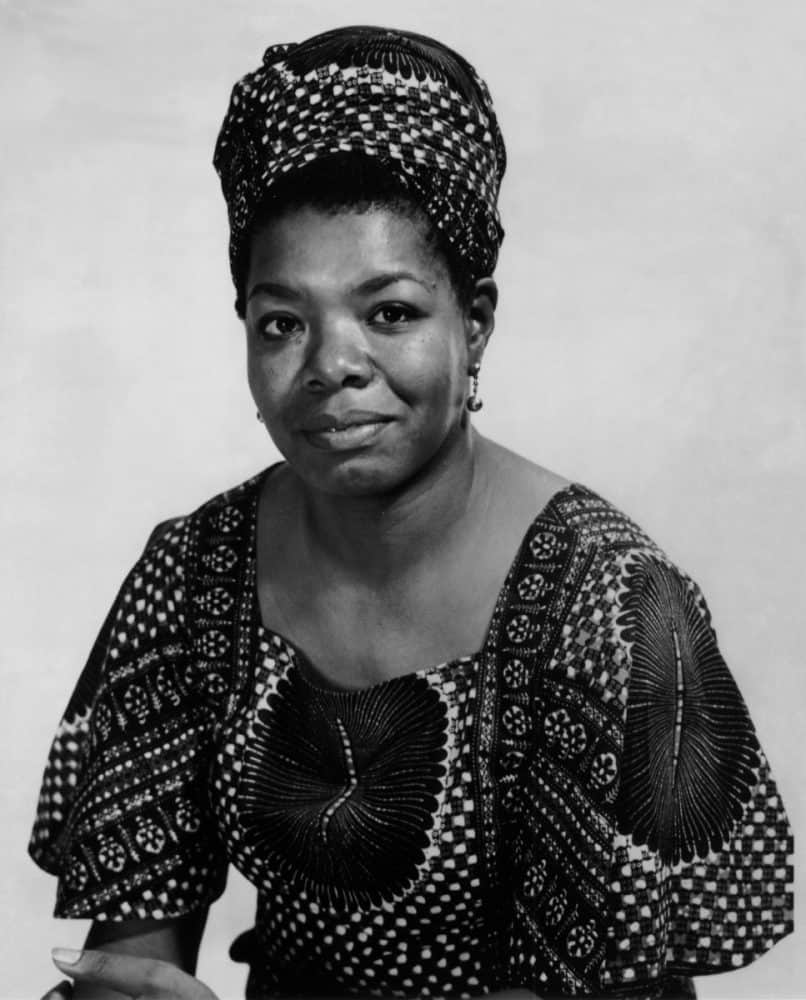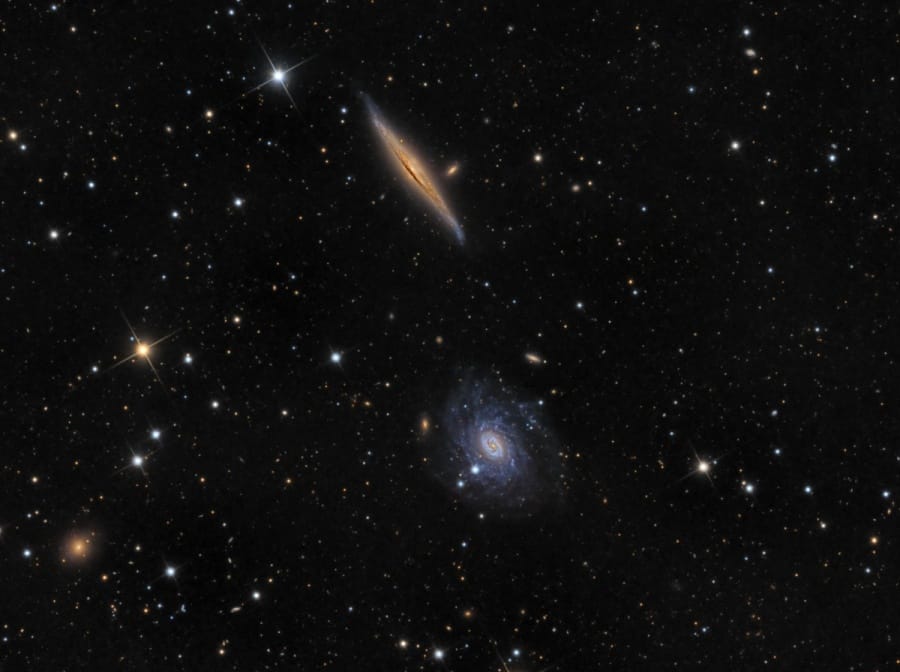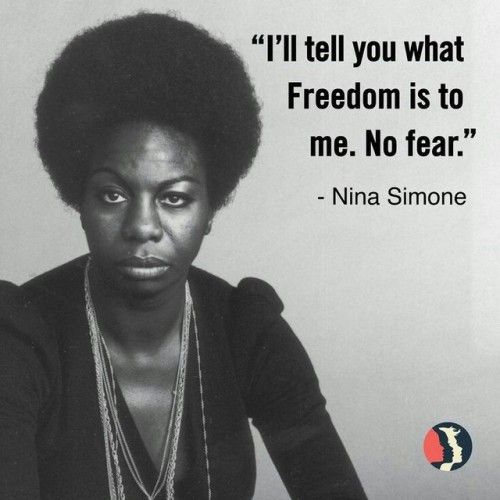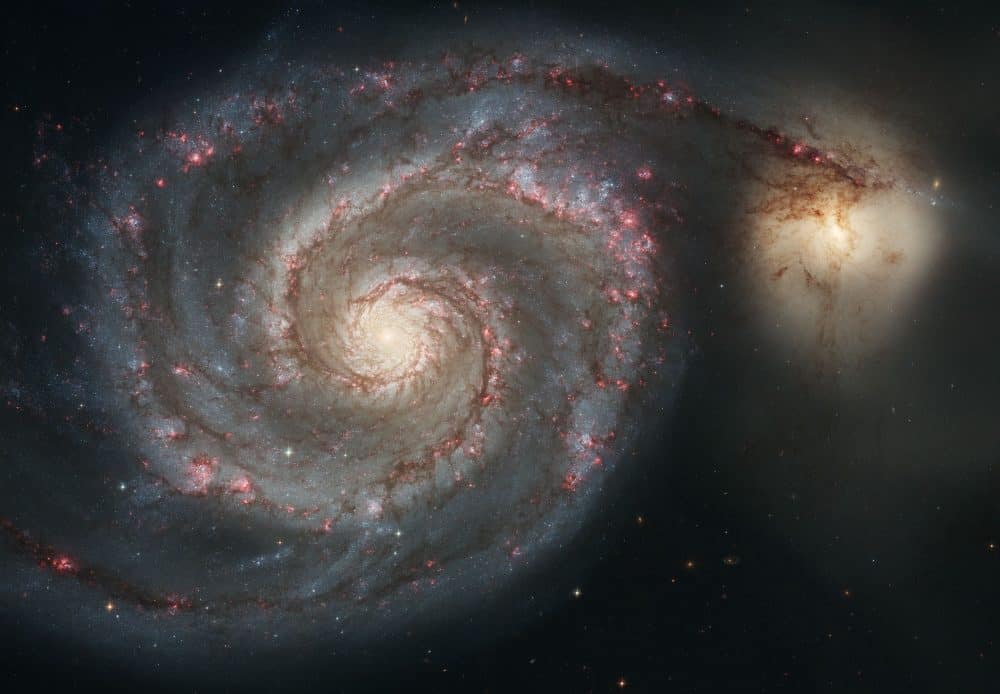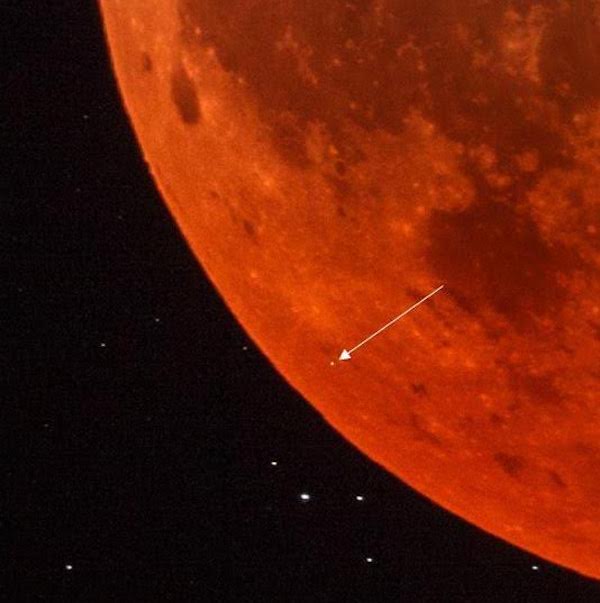Blog
“You only are free when you realize you belong no place — you belong every place — no place at all.”
more...These two spiral galaxies make a photogenic pair, found within the boundaries of the northern constellation Draco. Contrasting in color and orientation, NGC 5965 is nearly edge-on to our line of sight and dominated by yellow hues, while bluish NGC 5963 is closer to face-on. Of course, even in this well-framed cosmic snapshot the scene is invaded by other galaxies, including small elliptical NGC 5969 at the lower left. Brighter, spiky stars in our own Milky Way are scattered through the foreground. Though they seem to be close and of similar size, galaxies NGC 5965 and NGC 5963 are far apart and unrelated, by chance appearing close on the sky. NGC 5965 is about 150 million light-years distant and over 200,000 light-years across. Much smaller, NGC 5963 is a mere 40 million light-years away and so is not associated with the edge-on spiral. Difficult to follow, NGC 5963’s extraordinarily faint blue spiral arms mark it as a low surface brightness galaxy.
more...Benny Golson (born January 25, 1929) is an American bebop/hard bop jazz tenor saxophonist, composer, and arranger. He came to prominence with the big bands of Lionel Hamptonand Dizzy Gillespie, more as a writer than a performer, before launching his solo career. Golson is known for co-founding and co-leading The Jazztet with trumpeter Art Farmer in 1959. From the late 1960s through the 1970s Golson was in demand as an arranger for film and television and thus was less active as a performer, but he and Farmer reformed the Jazztet in 1982. Several of Golson’s songs have become jazz standards, including “Blues March“, “Whisper Not“, “I Remember Clifford“, and “Killer Joe”.
While in high school in Philadelphia, Golson played with several other promising young musicians, including John Coltrane, Red Garland, Jimmy Heath, Percy Heath, Philly Joe Jones, and Red Rodney. After graduating from Howard University, Golson joined Bull Moose Jackson‘s rhythm and blues band; Tadd Dameron, whom Golson came to consider the most important influence on his writing, was Jackson’s pianist at the time.
From 1953 to 1959 Golson played with Dameron’s band and then with the bands of Lionel Hampton, Johnny Hodges, Earl Bostic, Dizzy Gillespie, and Art Blakey and the Jazz Messengerswith whom he recorded the classic Moanin’ in 1958.
Golson was working with the Lionel Hampton band at the Apollo Theater in Harlem in 1956 when he learned that Clifford Brown, a noted and well-liked jazz trumpeter who had done a stint with him in Dameron’s band, had died in a car accident. Golson was so moved by the event that he composed the threnody “I Remember Clifford“, as a tribute to a fellow musician and friend.
more...Antônio Carlos Brasileiro de Almeida Jobim (January 25, 1927 – December 8, 1994), also known as Tom Jobim (Portuguese pronunciation: [tõ ʒoˈbĩ]), was a Brazilian composer, pianist, songwriter, arranger and singer. Widely considered as one of the great exponents of Brazilian music, Jobim is the artist who internationalized bossa nova and, with the help of important American artists, merged it with jazz in the 1960s to create a new sound with remarkable popular success.
He was a primary force behind the creation of the bossa nova style, and his songs have been performed by many singers and instrumentalists within Brazil and internationally.
In 1965 his album Getz/Gilberto was the first jazz album to win the Grammy Award for Album of the Year. It also won for Best Jazz Instrumental Album – Individual or Group and for Best Engineered Album, Non-Classical. The album’s single “Garota de Ipanema” (“The Girl from Ipanema”), one of the most recorded songs of all time, won the Record of the Year. Jobim has left a large number of songs that are now included in jazz and pop standard repertoires. The song “Garota de Ipanema” has been recorded over 240 times by other artists. His 1967 album with Frank Sinatra, Francis Albert Sinatra & Antônio Carlos Jobim, was nominated for Album of the Year in 1968.
Antônio Carlos Jobim was born in the middle-class district of Tijuca in Rio de Janeiro. His father, Jorge de Oliveira Jobim (São Gabriel, Rio Grande do Sul, April 23, 1889 – July 19, 1935), was a writer, diplomat, professor and journalist. He came from a prominent family, being the great nephew of José Martins da Cruz Jobim, senator, privy councillor and physician of Emperor Dom Pedro II. While studying medicine in Europe, José Martins added Jobim to his last name, paying homage to the village where his family came from in Portugal, the parish of Santa Cruz de Jovim, Porto.
https://www.youtube.com/watch?v=fz80O5FZrho
more...John Adams Estes (January 25, 1899 or 1900 – June 5, 1977), known as Sleepy John Estes, was an American blues guitarist, songwriter and vocalist. Estes was born in Ripley, Lauderdale County, Tennessee, either in 1899 (the date on his gravestone) or 1900 (the date on his World War I draft card). In 1915, his father, a sharecropperwho played guitar, moved the family to Brownsville, Tennessee. Not long after, Estes lost the sight in his right eye when a friend threw a rock at him. At the age of 19, while working as a field hand, he began to perform professionally, mostly at parties and picnics, with the accompaniment of Hammie Nixon, a harmonica player, and James “Yank” Rachell, a guitarist and mandolin player. Estes continued to work on and off with both musicians for more than fifty years. He also performed in medicine shows with Willie Newbern.
At the suggestion of Jim Jackson, Estes made his debut as a recording artist in Memphis, Tennessee, in 1929, at a session organized by Ralph Peer for Victor Records. He recorded the tracks “Drop Down Mama” and “Someday Baby Blues” with Nixon in 1935. He later worked with Son Bonds and Charlie Pickett. He later recorded for Decca Records and Bluebird Records, with his last prewar recording session taking place in 1941. He made a brief return to recording at Sun Studio in Memphis in 1952, recording “Runnin’ Around” and “Rats in My Kitchen”, but otherwise was out of the public eye in the 1940s and 1950s.
more...World Music on Flamenco Fridays featuring Tangos. The flamenco tango is distinct from the flamenco rumba primarily through the guitar playing. In Rumba the guitar flows more freely, whereas in Tangos the accents on beats 2, 3 & 4 are marked clearly with heavy strumming.
https://www.youtube.com/watch?v=XW3kaPpZQBg
more...The Whirlpool Galaxy, also known as Messier 51a, M51a, and NGC 5194, is an interacting grand-design spiral galaxy with a Seyfert 2 active galactic nucleus. It lies in the constellation Canes Venatici, and was the first galaxy to be classified as a spiral galaxy. Its distance is estimated to be between 15 and 35 million light-years.
The galaxy and its companion, NGC 5195,are easily observed by amateur astronomers, and the two galaxies may be seen with binoculars. The Whirlpool Galaxy has been extensively observed by professional astronomers, who study it to understand galaxy structure (particularly structure associated with the spiral arms) and galaxy interactions.
What later became known as the Whirlpool Galaxy was discovered on October 13, 1773, by Charles Messier while hunting for objects that could confuse comet hunters, and was designated in Messier’s catalogue as M51. Its companion galaxy, NGC 5195, was discovered in 1781 by Pierre Méchain, although it was not known whether it was interacting or merely another galaxy passing at a distance. In 1845, William Parsons, 3rd Earl of Rosse, employing a 72-inch (1.8 m) reflecting telescope at Birr Castle, Ireland, found the Whirlpool possessed a spiral structure, the first “nebula” to be known to have one. These “spiral nebulae” were not recognized as galaxies until Edwin Hubble was able to observe Cepheid variables in some of these spiral nebulae, which provided evidence that they were so far away that they must be entirely separate galaxies even though they are seen close together.
more...Joe Albany (born Joseph Albani; January 24, 1924 – January 12, 1988) was an American modern jazz pianist who played bebop with Charlie Parker as well as being a leader on his own recordings.
James Robert Forrest Jr. (January 24, 1920 – August 26, 1980) was an American jazz musician, who played tenor saxophone throughout his career.
Forrest is known for his first solo recording of “Night Train“. It reached No. 1 on the Billboard R&B chart in March 1952, and stayed at the top for seven weeks. “Hey Mrs. Jones” (No. 3 R&B) and “Bolo Blues” were his other hits. All were made for United Records, which recorded Forrest between 1951 and 1953. He recorded frequently as both a sideman and a bandleader.
Born in St. Louis, Missouri, United States, Forrest played alongside Fate Marable as a young man. He was with Jay McShann in 1940-42 and with Andy Kirk from 1942 until 1948 when he joined Duke Ellington. During the early 1950s, Forrest led his own combos. He also played with Miles Davis, in early 1952 at The Barrel Club. After his solo career, he played in small combos with Harry “Sweets” Edison and Al Grey, as well as appearing with Count Basie.
Late in life Forrest married Betty Tardy, and settled in Grand Rapids, Michigan, where he died in August 1980, aged 60, from heart failure.
more...James Avery Parrish (January 24, 1917 – December 10, 1959) was an American jazz pianist, composer and arranger. He wrote and recorded “After Hours“. Injuries from a bar fight in 1943 ended his career as a pianist.
Parrish was born in Birmingham, Alabama. His parents were Curley and Fannie G Parrish. Avery had at least one brother, who became an educator.
Parrish graduated from Parker High School in Birmingham. According to a gossip columnist in 1935, Parrish was at that time married to singer Velma Middleton.
Parrish studied at the Alabama State Teachers College, where he played in the Bama State Collegians, an ensemble led by Erskine Hawkins. He remained in Hawkins’s employ until 1942, and recorded with him extensively. Parrish wrote the music to “After Hours“, and a 1940 recording of the tune with Hawkins’s orchestra resulted in its becoming a jazz standard. He also wrote arrangements for Hawkins.
In August 1942 Parrish was injured in a car crash that killed Marcellus Green, one of Hawkins’s trumpeters. They were in a group of five in the vehicle, driving between Pittsburgh and Chattanooga to gigs when it overturned.Parrish left Hawkins later that year.
more...Oliver Mtukudzi, one of the most important figures in Zimbabwean music in the past decades, died on January 23, 2019 at the Avenues Clinic in Harare, Zimbabwe.
Oliver Mtukudzi, also known as “Tuku,” was born on September 22, 1952 in Harare. He was an acclaimed guitarist, vocalist, songwriter, composer, actor, philanthropist, human rights activist and UNICEF Goodwill Ambassador for the southern Africa Region.
more...https://www.youtube.com/watch?v=03chCg8l2yU
more...Astronomers are saying it might be the first known event of its kind, a flash of light seen during a total lunar eclipse. The eclipse took place during the night of January 20-21, 2019, and many caught it on film (see photos). But some sharp-eyed photographers and livestream viewers also noticed a flash on one edge of the moon, as a rock from space struck the surface of Earth’s companion world, just as the total eclipse was beginning.
Flashes on the moon have been reported before, but never on a moon in eclipse, to our knowledge. The flashes tend to be faint and short lived, and, when one occurs, astronomers want to check to be sure the flash isn’t from a camera, and not the moon itself. In this case, many images showed the same thing, a flash south of the crater Byrgiu – on the western part of the moon – at 4:41 UTC.
more...Gary Burton (born January 23, 1943) is an American jazz vibraphonist, composer, and educator. Burton developed a pianistic style of four-mallet technique as an alternative to the prevailing two-mallet technique. This approach caused him to be heralded as an innovator, and his sound and technique are widely imitated. He is also known for pioneering fusion jazz and popularizing the duet format in jazz, as well as being a major figure in music education from his 30 years at the Berklee College of Music.
Burton was born in Anderson, Indiana in 1943. Beginning music at six years old, he mostly taught himself to play marimba and vibraphone. He began studying piano at age sixteen while finishing high school at Princeton Community High School in Princeton, Indiana (1956–60). He has cited jazz pianist Bill Evans as the inspiration for his approach to the vibraphone.
Burton attended Berklee College of Music in Boston in 1960–61 and the Stan Kenton Clinic at Indiana University in 1960. He studied with Herb Pomeroy and soon befriended composer and arranger Michael Gibbs. After establishing his career during the 1960s, he returned to join the staff of Berklee from 1971–2004, serving first as professor, then dean, and executive vice president during his last decade at the college. In 1989, Burton received an Honorary Doctorate of Music from Berklee.
more...Curtis Counce (January 23, 1926 – July 31, 1963) was an American hard bop and West Coast jazz double bassist.
Counce was born in Kansas City, Missouri and moved to California in 1945. He began recording in 1946 with Lester Young, and in the 1950s in Los Angeles with musicians such as Shorty Rogers, Stan Kenton, Shelly Manne, Lyle Murphy, Teddy Charles, and Clifford Brown. Counce formed his quintet in 1956 featuring tenor saxophonist Harold Land, trumpeter Jack Sheldon, pianist Carl Perkins and drummer Frank Butler. Elmo Hope replaced Perkins after his death at age 29 in 1958. Gerald Wilson replaced Sheldon on some recordings. The four albums originally released on Contemporary Records were reissued in 2006 on a double CD by Gambit Spain. Counce died in Los Angeles, California, of a heart attack.
https://www.youtube.com/watch?v=vugd351ggOY
more...More Posts
- Henry “Rubberlegs” Williams Day
- World Music with Noe hernandez cantarell
- Daily Roots with Barry Brown
- The Cosmos with NGC 3627
- Albert Ayler Day
- Pete Escovedo Day
- World Music with Paco de Lucia
- Daily Roots with Michael Rose
- The Cosmos with RCW38
- Big John Patton Day
- Paul Gonsalves Day
- World Music with Martá Sebestyén
- Daily Roots with Prince Buster
- The Cosmos with R Aquarii
- Tomasz Stanko Day
- Clyde Bernhardt Day
- World Music with Diali Cissokho & Kaira Ba
- Daily Roots with Linval Thompson
- The Cosmos with NGC 3576
- Bela Fleck Day
